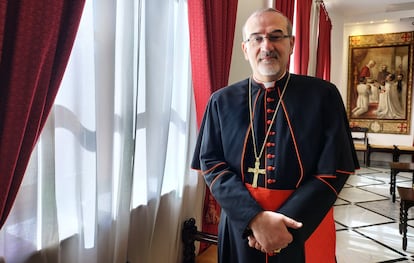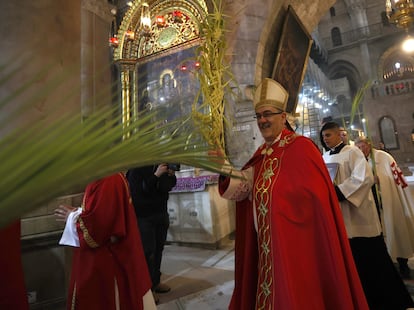The Latin Patriarch of Jerusalem on the 1,000 Christian refugees in Gaza: ‘They have nowhere to go. Nowhere is safe’
Pierbattista Pizzaballa, the highest Catholic authority in the Holy Land, says the competing narratives of Israelis and Palestinians must be understood to avoid ‘falling into the temptation of dehumanizing others’

In the 24 years he has been in the Holy Land, Cardinal Pierbattista Pizzaballa, 58, has never seen so much violence. “Hatred, resentment, revenge, mistrust... Everything together with such intensity,” he laments in an interview with EL PAÍS to mark an Easter Week in which he led a sad Palm Sunday procession from the Mount of the Olives in Jerusalem. It is a traditionally festive day, with songs and olive branches to remember Jesus’ entry into the city, but this year, there was no music and hardly any participants, since there are practically no tourists or pilgrims. Gazan Christians are just trying to survive, and many West Bankers fear crossing into Jerusalem and require permission to enter from the Israeli army.
Pizzaballa, of the Franciscan order, is the highest Catholic authority in the Holy Land. Since 2020, he has been the Latin Patriarch of Jerusalem: he represents the Pope in the area and oversees the Latin rite churches in Israel, Palestine, Jordan and Cyprus. Between 2004 and 2016, he served as Custos of the Holy Land. During that time, Pope Francis entrusted him with organizing an unprecedented prayer for peace in the Vatican gardens with the then prime minister of Israel, Shimon Peres, and Palestinian President Mahmoud Abbas.
Because of his position, Pizzaballa is in constant contact with Catholics in Gaza. The tiny Christian community (about 1,000 people, the majority Greek Orthodox, with 180 Catholic) has chosen to shelter in a church and another religious site in the capital of Gaza instead of complying with the Israeli army’s order to flee to the south, where more than half of Gaza’s population is crowded together. Israeli Prime Minister Benjamin Netanyahu has also promised to launch a ground incursion in the south, with or without the support of his allies.
“They found refuge there at the beginning of the war and, despite all the army’s calls to evacuate, they decided to stay, like many others. First of all, because they don’t know where to go. They don’t have anywhere. And nowhere in Gaza is safe, neither in the north nor in the south,” he says in the building of the Latin Patriarch of Jerusalem, in the Christian quarter of the old walled citadel.
The situation in northern Gaza is so desperate that Christians have begun to draw on their food reserves in homes and parishes. According to Pizzaballa, they are dipping into their supplies “very carefully,” because they don’t know when they will be able to replace them. “It is very difficult to get food. There is not enough for everyone. Before you could buy it on the black market, the only one that worked. Now there is not even food to be found there. It is not a question of money, it is a question of finding food,” he says.
Typically, Pizzaballa notes, “they cook once or twice a week” for the entire community. Last Monday, the Integrated Food Security Phase Classification (IPC) — the main global analysis tool for food security and nutrition — reported that half of the 2.3 million people in Gaza are suffering from extreme lack of food and that a famine in the north — where the Christian community is located — is “imminent.”

Just under 600 people are sheltering in the Holy Family Church, the only Catholic church in Gaza, and another 249 are in a Greek-Orthodox church. In addition to hunger and the Israeli strikes, the main problem is the lack of medicine, explains Pizzaballa. “Some are sick and need medicine, but it is very difficult to get it to them. It is very difficult to find drivers who are willing to go from the south to the north [of Gaza] because it is dangerous,” he explains. The police of the Hamas government do not protect humanitarian aid convoys, as it puts them at risk of being bombed by Israel. Some convoys have been assaulted by hungry crowds, armed family groups or bombed by the Israeli army.
Every Christmas, Pizzaballa used to go to Gaza to join the handful of Catholic families in the territory. This year he wasn’t able to, so during his televised Midnight Mass he asked for an Arabic translator in order to address them from the West Bank city of Bethlehem, where tradition places the birth of Jesus.
The vast majority of Christian families remain in Gaza, despite the fact that they tend to have more connections abroad. They have only been able to leave through Rafah, the border post with Egypt. Some have dual nationality or already had visas to countries like Canada or Australia, says Pizzaballa. Others — like thousands of Muslim Palestinians — have paid the mafia to include their names on the Egyptian police list of those authorized to leave Gaza.
“They are very worried about the future. What will happen? What should they do? Where will they go? The Pope also calls them quite frequently,” says Pizzaballa. “[They ask] that we support them, that we do not abandon them as much as possible. And we are not abandoning them,” he adds.
Of the more than 32,000 people killed by Israeli fire in the war in Gaza, about 20 are Christians. The vast majority (18) were killed when Israel bombed the Greek Orthodox church of Saint Porphyrius. Israeli shooters killed three others in the Holy Family Church, and a fourth died due to lack of medical care after falling in the compound, explains Pizzaballa.
The patriarch insists that, despite the situation, reconciliation and respect are part of the message of the Gospel and, in these moments, it is particularly important “to use appropriate terminology, without falling into the temptation of dehumanizing others, as has happened many times.” “There are two narratives: the Israeli one and the Palestinian one. Everyone sees the perspective from their own point of view. And no attention is paid to the other party’s perspective, needs or situation. It is not new, but it has become very evident, very painful, in this war,” he laments.
Pizzaballa unintentionally made headlines shortly after the Oct. 7 attack, in which Hamas-led militants and some civilians killed about 1,200 people (mostly civilians) and took more than 240 hostages. After the November ceasefire deal, in which Israeli hostages were released in exchange for Israeli prisoners, 134 still remain in Gaza. Pizzaballa made the news because, when asked by a journalist, he expressed his “absolute availability” to be exchanged for the Israeli children kidnapped on October 7.
“In this context of hatred, resentment, revenge and mistrust, we need gestures of justice, reconciliation, love and respect,” he explains today. “One of the elements of this war is language. You have to use terminology in which things that are true are said, but with respect. Our role is not to be mediators, but to facilitate dialogue, and it is important to keep the focus on the future alive.” “Keep in mind,” he adds, “that we are all still going to be here, and we will have to deal with one another.”
Sign up for our weekly newsletter to get more English-language news coverage from EL PAÍS USA Edition
Tu suscripción se está usando en otro dispositivo
¿Quieres añadir otro usuario a tu suscripción?
Si continúas leyendo en este dispositivo, no se podrá leer en el otro.
FlechaTu suscripción se está usando en otro dispositivo y solo puedes acceder a EL PAÍS desde un dispositivo a la vez.
Si quieres compartir tu cuenta, cambia tu suscripción a la modalidad Premium, así podrás añadir otro usuario. Cada uno accederá con su propia cuenta de email, lo que os permitirá personalizar vuestra experiencia en EL PAÍS.
¿Tienes una suscripción de empresa? Accede aquí para contratar más cuentas.
En el caso de no saber quién está usando tu cuenta, te recomendamos cambiar tu contraseña aquí.
Si decides continuar compartiendo tu cuenta, este mensaje se mostrará en tu dispositivo y en el de la otra persona que está usando tu cuenta de forma indefinida, afectando a tu experiencia de lectura. Puedes consultar aquí los términos y condiciones de la suscripción digital.









































